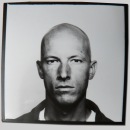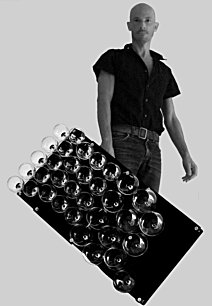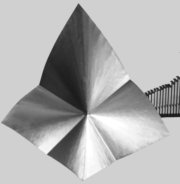the magic sound of the glass harp
Steffen Kreuzer talking about building and playing the glass harp

How did you get the idea of making music with glasses?
By chance I got a LP by Bruno Hoffmann “Zauber der Glasharfe”. Even if the classical compositions did not really appeal to me, I was immediately fascinated by the sound of the glasses. 1994 I built my first glass harp, which is still in use. Before that, I have already experimented with only a few glasses and evolved techniques like Wah Wah, tremolando, glissando.
Glissando?
Yes, you can tilt the glass or put objects into it. If you have only a very limited number of tones available, you have to deal with all sonic possibilities of each single glass.
Your glasses are filled with water. Is that to tune your instrument?
Yes, the fine-tuning. You can lower the tone pitch if you fill water into it. After that the instrument cannot be moved anymore. Trouble can also arrive, when water evaporates and the pitch rises. I tried to tune the glasses at the glazier's workshop, but now I like the water in the glass, you can see the sound waves on the surface.
What kind of water are you using? Ordinary tap water?
To tune the instrument I use distilled water to avoid a deposit of calcium carbonate.
How long does it take to tune your instrument? Are there markings on the glasses?
The markings on the glasses are for orientation only. That is not enough accurate. At a certain level already a few drops lower the pitch immediately. I use a chromatic tuner and my ears. It takes about 30 minutes.
 For transportation all the water has to be removed. And the glasses? Do you have to pack them individually?
For transportation all the water has to be removed. And the glasses? Do you have to pack them individually?
No, no, they are all fixed on the table. The entire board is put into a large Styrofoam case. I replaced the back seat of my car with four inner spring mattresses to protect the glassharp.
Probably quite nerve-racking to drive to performances with the instrument... How expensive are the glasses?
Between 4 and 30 Euro. But it's not the money what makes them precious, it's the time that you need to find the glasses. You don't care about the selling price if you finally have found a glass with a certain frequency. I spent a lot of time in the glass factories in the Bavarian Forest to collect them. Some of them are second choice because they are too thick- or thin-walled blown, but that is exactly what I am seeking for. The wall thickness influences the pitch and of course also the size of the glass.
Have glasses got broken while playing?
No, fortunately not. But I have already tried to break a very thin-walled glass only by very loud sounds of the same frequency. Until now, in vain.
How large is the tone range?
Two and a half octaves. My new instrument has three and a half. The lowest tone is an e, respectively d on the new instrument. To find a lower glass is difficult because it has not only to be larger but also with thinner wall thickness. It should be specially manufactured. And whether the attack is good, you only know afterwards. Glasses with very high sounds are easier to find, but they usually have a poor sound quality.
I was astonished about the volume and sonority you can generate.
Yes, that still surprises even me. Sometimes, after a performance, listeners come to my table because they think there is a hidden loudspeaker! A single handheld glass sounds rather softly and thin. But the glasses in my instrument are standing so close together that they are serving as resonators. I often play three or more glasses at the same time to get a full sound. In addition, I don't accept poor-sounding glasses in my instrument.
Have you already played with electronical amplification?
I don't like that so much. I think it's a big difference whether all the sounds come from one or two speakers or each sound from the respective glass. Music should be direct. I don't like concerts where the musician is standing in the middle of the stage and the tone is coming from a loudspeaker at the edge of the stage.
Without amplification, how high can the number of listeners be?
Hard to say, it depends on the acoustics of the room. In an adequate room 200 listeners are no problem.
Are you the only glass-musician?
No, there are several. Hm, maybe ten in Europe, or even more? Most of them play popular melodies or original compositions for glass harmonica by Mozart and others. I have a totally different intention with my music. By the way, in the 18th century there was a doctor (Franz Anton Mesmer) using glass music for healing and hypnosis.
What is the idea behind your music?
I spend a lot of time with everyday objects like normal drinking glasses until I can use them to step out of normality. I like the “narrowness” and simplicity of my instrument. A synthesizer with infinite sound possibilities would frustrate me.
Are you also the composer?
I exclusively play my own compositions, some contain improvised parts. The positioning of the glasses leads to the composition. The compositions can only be played on this special instrument.
How are the glasses arranged? Is there a common way to do this?
No, every glass-musician does it his own way. Before I built my first glass harp, I examined the original instrument of Bruno Hoffmann (German glass harp player 1913-1991), and his idea was to play a triad with only one hand. If you arrange the glasses like a piano keyboard you need both hands to play large intervals.
 For the construction of the instrument you need already a musical background. Do you play any other instrument?
For the construction of the instrument you need already a musical background. Do you play any other instrument?
Yes, guitar. As a child I learned Cello and Double bass. After finishing high-school I studied music-science in Hamburg. I am also experimenting with other common objects which you can use as a musical instrument: wood bowls, spoons, knives, singing saw. Moreover, harmonica and Jew's harp. Last year, I built a Crystal. The brothers Baschet have invented it about 50 years ago. You can play it by rubbing glass rods which are connected with a huge stainless steel resonator. I always had fun building new instruments and discovering new sounds.
How does the sound of the glass harp fit to other instruments?
There are lots of possibilities: Voice, flute, vibraphone, or even speech. I have given concerts with a harmonica player (Daniel Hildebrand) and with a storyteller. There exist orchestral scores in which glasses are used, for example, by Richard Strauss. Mozart has composed for glass harmonica together with flute, oboe, viola and cello.
Does there exist a CD from you?
No. I play only live.